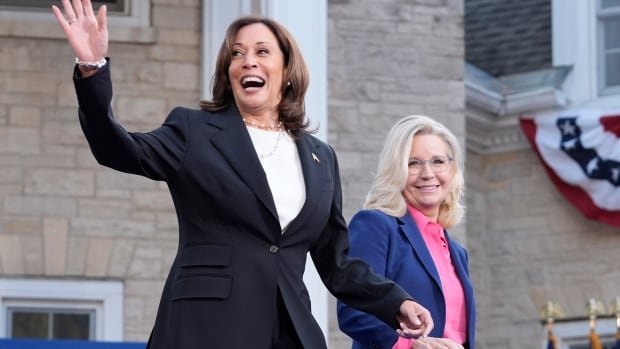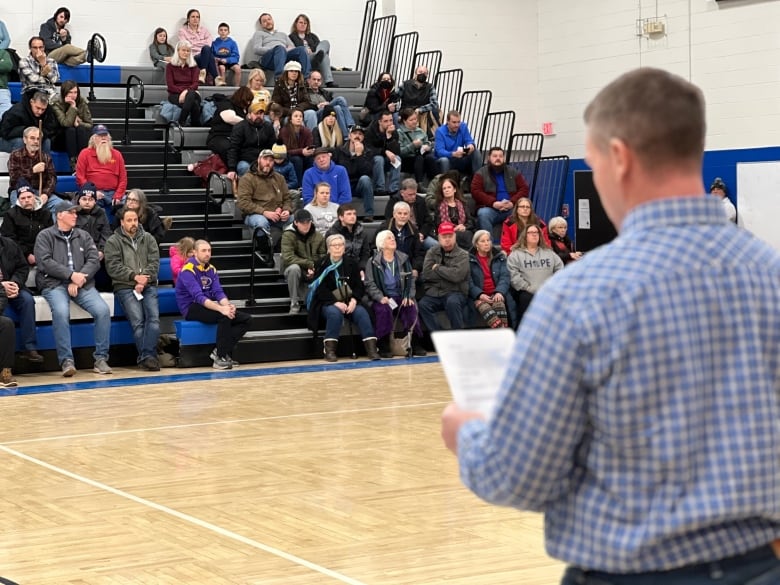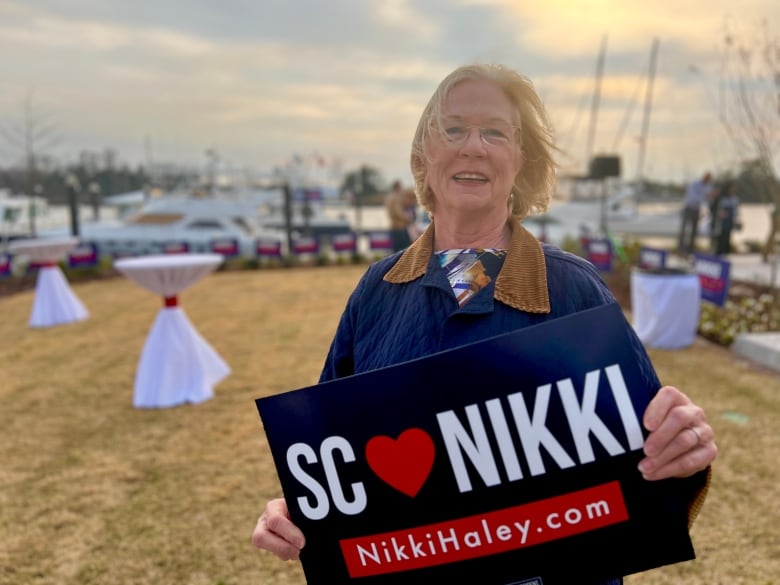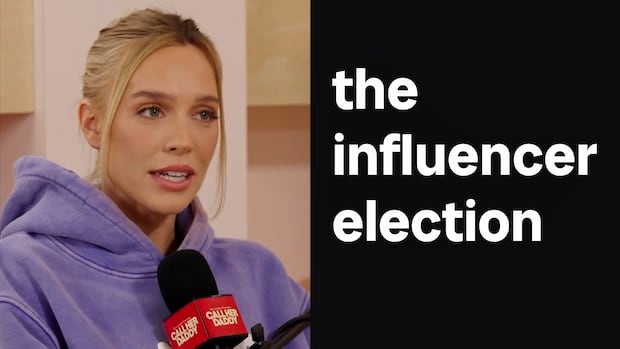
This American voting year began on a frosty night in Iowa, when thousands gathered in places like a high school gym outside Des Moines to hear speakers like Joel Akers.
The longtime Republican had twice voted for Donald Trump, but he urged his neighbours in that Iowa caucus last January to move on; his bond with Trump, he said, was irrevocably snapped amid the violence of Jan. 6, 2021.
His entreaty fell flat. Trump dominated in Iowa and romped to the Republican nomination, easily vanquishing Nikki Haley, Akers’s preferred candidate.
Months later, millions of voters like Akers remain a wild card in this election. The question now is: Where will Haley’s supporters turn?
“I don’t think I’m gonna vote for Trump,” Akers said, when CBC News recently checked in with him, ahead of the Nov. 5 general election.
The farming equipment salesman said he just can’t back someone who jokes about being dictator for a day — no matter if Trump said it in jest.
He’s not thrilled with his choices in this election and is no fan of Kamala Harris either. But he figures he’ll back her or choose a third-party candidate.
Anecdotes like this offer Harris a degree of hope — and vindication. It would validate the strategy she’s built her campaign around: play for disaffected Republicans.
In other words, she’s betting on the Haley voter.
It’s the reason Harris keeps talking about how she owns a gun — and would use it. Why her summer convention at times resembled a Republican rally, from the crowd chants of “U-S-A!”, to the numerous Republican speakers featured, to Harris extolling the lethal power of the American military. It’s why she’s memory-holed her past left-leaning policies.
She’s courting middle America right down to cracking open a can of Wisconsin suds on late-night TV. She’s even promised to include a Republican in her cabinet.
This strategy is grounded in simple electoral arithmetic. Haley’s campaign demonstrated that there is a critical mass of Republican voters resistant to Trump.
To note one striking example: long after Haley had suspended her bid, she still got nearly 17 per cent among the registered Republicans who voted in the Pennsylvania primary — in other words, a group vast enough to decide an election.

Is it working? The evidence is mixed
So is Harris’s bet paying off?
There are some signs, in some polls, that it might be. Yet the data are inconsistent. And you detect signs of that uncertainty in conversations with some of these voters.
Take retired nurse Leslie Cochrane, who attended a Haley rally just before the South Carolina primary.
A frequent Republican voter, Cochrane’s partisanship is unpredictable. She volunteered for Gerald Ford in 1976, ended up admiring the man who beat Ford, Jimmy Carter, and voted for Carter against Ronald Reagan; she later voted for both Bushes, as well as Barack Obama.
Nowadays she has no patience for Trump — calling him spiteful and vengeful — and says she’s nervous about him holding power again. But she’s not sold on Harris either, describing her as a little too slick, her public statements too canned.
“[Harris] strikes me as someone who will say whatever she needs to say in the moment — whether or not it’s accurate,” Cochrane said this week.
“[But] I like her better than Trump.”
So what will Cochrane do? She’s still grappling with her choice. Her current favourite option: cast a protest vote by writing in Haley’s name.
These sorts of ongoing personal dilemmas make it hard to read the polls, which themselves are mixed about whether Harris has made inroads on the right.
“I see it in some polls and not others, so it’s hard to be definitive,” said Marc Trussler, director of data science at the Program on Opinion Research and Election Studies at the University of Pennsylvania.
“There is some movement, but it’s hard to pick that up in polls.”
The bigger picture: An educational realignment
On the one hand, a New York Times survey shows Harris with nine per cent of the Republican vote — an outstanding result for her compared to past elections and compared to Trump, who, in that same survey, had just three per cent of self-identified Democrats. Harris also does staggeringly well in another poll of Haley Republicans, winning more than a third of them and was found leading in a Republican-voting Pennsylvania congressional district.
Yet other polls show Harris with slightly less, or much less, support among Republicans than those above-mentioned surveys.
Trussler’s prediction is we’ll only know with the benefit of hindsight, after the election, whether Harris’s gambit paid off.
He says there’s a bigger portrait still coming into focus, and Haley voters are just one snippet of it. It’s the broad story of American politics right now in the realignment of voters along educational lines — college-educated voters, including Haley’s, are drifting one way, toward the Democrats, and non-college-educated, non-white voters are drifting the other way, toward Trump.
It’s hard to predict in advance who the net winner of this swap might be.
Another elections analyst says one reason for the polling being all over the map is the ways pollsters might define a Republican voter: Is it a registered Republican? A self-identified Republican? A person who usually votes Republican?

The key: Turnout, turnout, turnout
“You don’t know until people actually show up,” says Drew McCoy, president of Decision Desk HQ.
He jokes that there’s a reason the old cliche, “It all comes down to turnout,” keeps getting repeated in every election. “It’s a cliche because it’s true.”
Turning out uncertain voters is why, McCoy says, the candidates are appearing on non-political podcasts, trying to reach people who aren’t that keen on politics.
WATCH | Harris, Trump turn to influencers to boost voter turnout:
The U.S. presidential campaigns leaned on influencer power this week, with Kamala Harris appearing on the popular podcast Call Her Daddy and Elon Musk jumping on stage at a Trump rally. The National breaks down why the unconventional election moves are a strategy designed to snag valuable voters in crucial states.
Conversely, on one political podcast, a prominent Democrat discussed his mixed emotions about courting these right-wing votes.
“Sometimes I look at this and I’m, like, ‘We are really campaigning with Liz Cheney?'” said Dan Pfeiffer, a former Obama White House official, on his show Pod Save America.
“But then you step back and you think [and] it makes incredible sense,” he said. “We need to build a big tent and we should invite everyone who wants to defeat Donald Trump into that tent and that includes Liz and — I even hate to say it — Dick Cheney.”
Trump, meanwhile, has attempted his own version of this, including former Democrats like congresswoman Tulsi Gabbard and Robert F. Kennedy Jr. at his campaign stops.
A conservative fretted in the Washington Post about one notable politician who hasn’t been invited to appear with Trump at rallies: Haley.
“Why is Trump not deploying her?” wrote Marc Thiessen, a George W. Bush speechwriter, describing Haley as a natural person to speak with centre-right voters who dislike Trump.
“It could very well cost [Trump] the presidency.”
